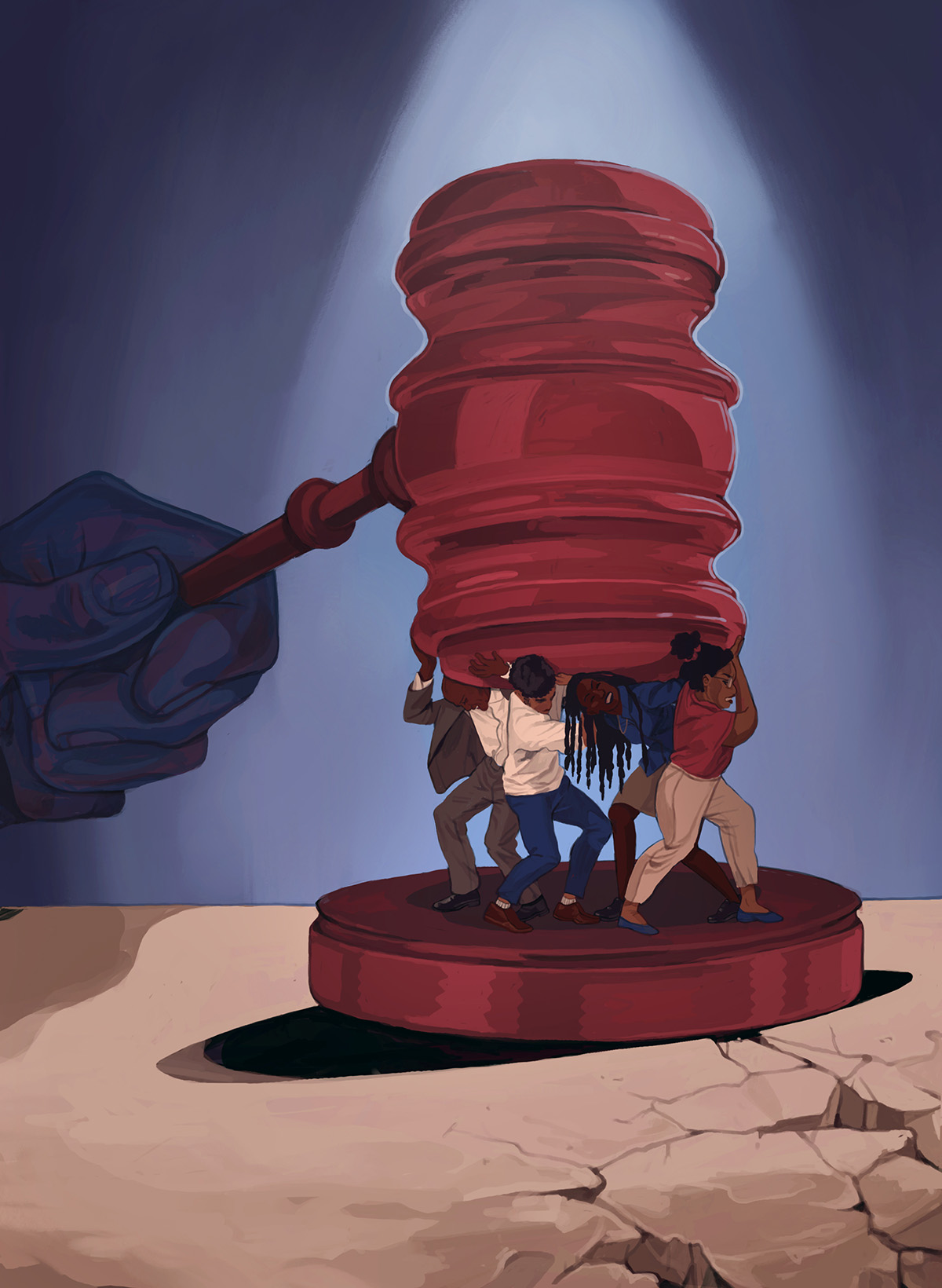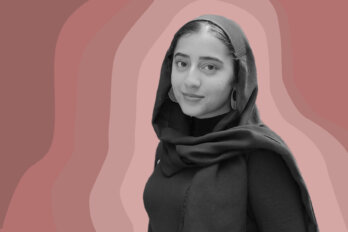When Sara Ghebremusse arrived at the Peter A. Allard School of Law at the University of British Columbia in 2017, she was the only Black female professor in the faculty. She had been working toward the position for several years. Her family is from Eritrea, where mining companies are accused of forced labour and other human rights violations, and Ghebremusse pursued law with an interest in economic and environmental justice. At Allard, one of the most prestigious law schools in Canada, she wanted to be an activist academic, researching and teaching about the devastating effects of resource extraction in African countries.
She knew she was stepping into a space that wasn’t designed for Black voices. Only about 4 percent of students enrolled in the country’s twenty-four law schools are Black, according to the Black Law Students’ Association of Canada. Systemic, financial, and cultural hurdles can make it difficult or impossible for Black students to be accepted into these programs, let alone to pursue the profession. As part of her activism, Ghebremusse wanted to help reform the admissions process at Allard.
Between 2020 and 2021, she worked with the BLSA on a list of recommendations for how the school could recruit more Black students. The report proposed collecting race-based enrolment data, running anti–Black racism training for admissions staff, and having at least one Black professor review applications from Black students. Ghebremusse also advocated for a dedicated admissions stream for Black applicants, something other law schools, including those at the University of Victoria and Queen’s University, had already instituted.
While Allard did end up creating the new stream, the admissions committee did not share the race-based enrolment data with faculty, and it was not clear how it would act on any of the other recommendations. Without numbers, Ghebremusse argued, any progress seemed superficial. The selective and opaque way in which the report had been implemented left many racialized academics feeling betrayed.
At the same time, tensions were building up among faculty. That year, the department hired the law firm Southern Butler Price to assess its working culture. After interviewing forty-two faculty members, the firm described an environment rife with systemic discrimination and harassment.
It took less than four years for Ghebremusse to start planning her exit from what was supposed to be her dream job. She says the administration failed to deal with bullying from senior staff, and that she felt excluded in her department. “I didn’t belong,” she said in her farewell speech, in the spring of 2023, in the small faculty lounge overlooking the ocean. “At least not ‘here’ as it is currently constructed.”
This is a familiar story. Experiences like Ghebremusse’s drew a spotlight in the wake of anti–Black racism protests in the summer of 2020. Institutions across North America scrambled to introduce diversity, equity, and inclusion initiatives. They sent out statements, mandated staff to attend DEI workshops, and hired Black employees. But racialized faculty felt ignored or silenced when it came time for them to share their perspectives. They found themselves in the painful position of working with colleagues who championed DEI initiatives but pushed back against any concrete changes or accountability measures. Instead of progress, some departments—like Allard—experienced even deeper division and strife.
In December 2019, Brenna Bhandar, a scholar whose legal studies focus on colonialism, race, and feminism, was interviewed by Allard for the position of associate professor. Months later, when the appointments committee recommended hiring her, a few professors objected. In her research, Bhandar uses the lens of settler colonialism to understand how Israeli property law has been used to dispossess Palestinians of their land—a framework some argued was antisemitic.
Catherine Dauvergne, the dean at the time, called the entire faculty for a Zoom call on March 31, 2020. “I’m not convinced that Bhandar is involved in antisemitic action,” she said. “But I have nonetheless reached a very difficult decision . . . to not make her an offer.” She added, “I don’t think it’s about her views. I think it’s about our incapacity as a community to deal with ideological diversity, which is something we need to work on.”
Dauvergne’s statements set off a debate. “You said it wasn’t about her political views . . . to me that is about political views,” one professor said. “It’s making a decision about hiring a colleague that some members of the community would be upset by their political views, and that’s very dangerous territory.” Another professor defended Dauvergne’s judgment. If an Indigenous faculty member had accused a candidate of anti-Indigenous bias, they said, that would be enough to stop the hiring process.
A few professors who opposed the decision, including Ghebremusse, started to organize. On April 16, twelve faculty members wrote a confidential letter to Dauvergne, calling the integrity of the hiring process into question. The letter argued that the choice not to bring Bhandar on violated UBC’s academic freedom policies—faculty should be able to hold and express differing political views—and went against Allard’s commitment to equity and diversity (Bhandar is South Asian). It also suggested that racialized candidates “are subject to more stringent evaluative criteria, exacerbating their barriers to recruitment.”
Two weeks later, Dauvergne reversed course. She sent an email saying that UBC had made an offer to Bhandar, but she gave no explanation for the change of heart. She also refused to meet with the letter’s twelve co-authors, who had asked to discuss how the faculty would prevent what happened in the hiring process from happening again. According to sources with close knowledge of the situation, Bhandar received an offer in July 2020 and continues to work at Allard as an associate professor.
Things took a turn for the worse when Cristie Ford, then associate dean, forwarded the confidential letter, with the names of the co-authors redacted, to the rest of the faculty. “It is distressing to be told, as I read this letter to be telling me, that my commitment to equity, diversity, and inclusion must be suspect if I don’t agree with some colleagues on issues taking place on the other side of the world,” Ford wrote in the email. She also implied that faculty members did not have a right to criticize the hiring process, arguing that the letter was intended to intimidate Dauvergne. (Ford declined to be interviewed for this story.)
It’s not clear how other faculty learned the names of the co-authors, but in the months that followed, the letter signers said they were shunned. They were no longer invited to their colleagues’ homes for dinner, and scheduled meetings with the dean were cancelled at the last minute. Some faculty members were upset with the co-authors of the letter for supporting Bhandar; others felt the dean had been put in a difficult position and believed that the signatories had betrayed her. Eventually, three of the junior faculty members on the list were pressured into separate meetings with Ford.
Ghebremusse, in particular, was concerned when Ford asked for an in-person meeting to discuss her dissertation. Ghebremusse had finished her PhD the previous year. It was also the beginning of the COVID-19 pandemic, and any social contact could have endangered Ghebremusse’s husband, who has asthma. But as associate dean, Ford had the power to dictate which professors received research funding and had a vote in determining faculty members’ ability to receive tenure. Ghebremusse eventually felt pressure to comply.
During their outdoor meeting, Ghebremusse says, Ford told her that signing the letter was wrong. She says Ford called her naive for participating, given she was pre-tenure and did not have the same job security some of the other co-authors did. Before they ended the conversation, Ghebremusse says, Ford promised to support her research as long as Ghebremusse supported her in her role as associate dean. It was that request that put Ghebremusse on edge for months.
“It was like a dark cloud hanging over me,” she says. “I couldn’t say or do anything about it, and now I had greater scrutiny over what I said and my work.”
In the summer of 2020, Ghebremusse and a few other department members went to the UBC Faculty Association. The union agreed that Ford’s sharing of the letter had caused divisions among staff and damaged the reputations of the co-authors, and that her meetings with junior faculty members were an abuse of power that created a chill at Allard.
The union began informal talks with the dean’s office, which prompted Ford to email an apology to faculty. “I recognize that I was insufficiently attentive to the real and perceived power imbalance between me and others,” she wrote. “I am sincerely sorry if I made anyone feel intimidated or unfairly treated in any way . . . I have a better understanding of how well-intentioned colleagues impacted by or concerned about systemic racism might have signed the letter they sent to the Dean.” However, Ford argued that the letter writers did not appreciate how some of the claims in it might be experienced by their Jewish colleagues.
The union was not satisfied by the apology. It saw Ford’s actions as an attempt to silence criticism of Allard—a violation of academic freedom and an offence that should see her removed from her position as associate dean. “We are asking that she be relieved of the role because she has abused the position, and demonstrated that she cannot be trusted with the responsibilities conferred upon her, not because of her views on any matter,” Alan Richardson, then president of the faculty association, wrote in December 2020. After several conversations between the union and Allard administration, the former filed a grievance, forcing UBC to decide whether to discipline Ford and how to deal with the aftermath of the letter.
On March 3, 2021, Ford resigned as associate dean but remained on staff as a professor. By this time, after completing her five-year term as dean at Allard, Dauvergne had taken up a new position as vice president academic and provost at Simon Fraser University. Interim dean Janine Benedet wrote to faculty acknowledging that academic freedom includes the right to raise concerns about hiring practices, with no fear of retaliation. Benedet stated that current and future associate deans would receive management training and formally apologized for the dean’s office breaching confidentiality by publishing the letter.
In July of that year, UBC announced that Ngai Pindell would be Allard’s new dean—the first Black professor to hold the position. But even with all the change in the department, the union and the university decided to move forward with an internal review looking into whether UBC’s harassment and bullying policies had been violated over the course of the previous months.
The Southern Butler Price assessment was completed in October 2021. Based on interviews with more than forty faculty members, the report focused on how the department operated under Dauvergne, who served as dean from 2015 to 2020. It found, for example, that people frequently swore and yelled at each other in meetings. It also noted that Allard was lagging behind the rest of the university in its diversity and inclusion initiatives. It proposed establishing the position of equity, diversity, and inclusion associate dean—a professor who could be responsible for providing anti-discrimination training to the department. Other recommendations included creating more transparency around hiring.
Earlier this year, Pindell announced that Supriya Routh, associate professor, would become the first associate dean of equity, diversity, and inclusion at Allard. But some faculty members pointed out that many of the other recommendations were not implemented. The school hasn’t conducted an equity audit, revamped its hiring policies, or provided training to staff on race and discrimination. One faculty member, who asked to remain anonymous, confirmed that the equity committee has not been part of the selection process, and that Pindell suspended the committee earlier this year without any explanation. Other racialized faculty said they were unhappy with the results of the report and that their demands for transparency were still not being met.
“We were made to feel like everything was okay, but it wasn’t,” says Ghebremusse. “We thought this process would bring changes to the institution, but it didn’t.”
In the midst of tensions around Bhandar’s hiring and the subsequent review, some faculty were raising other concerns. Last year, three female professors said they were being paid less than their white male counterparts, but Pindell dismissed the allegations. One of the professors claimed that a white male professor who had the same number of years of experience as her was making $20,000 more per year. Another female professor, who was not part of the complaint and asked to remain anonymous, said she was being paid less than her male counterparts, including one who started with less experience but received substantially faster raises and promotions.
Faculty also experienced pushback when they tried to set up resources for Black students. The BLSA’s 2021 recommendations on how to recruit more Black students were mostly ignored. In another instance, a racialized female professor submitted a $750,000 proposal to the Law Foundation of British Columbia for the creation of a centre at UBC that would specialize in anti-racism and the law. The first of its kind in Canada, it would set up a network of Black, Indigenous, and racialized law professors. It would also offer anti-racism training to students and lawyers.
Pindell initially approved the proposal but later said he was concerned that white faculty members would feel excluded. He wanted his office to take over the initiative, which was unusual, and despite repeated requests to do so, he would not confirm what the female professor’s role in the project would be. Typically, centres are created and run by professors, since they are the ones responsible for conducting research and building communities. (None of Allard’s four other centres are managed by the dean’s office.) Pindell says he suggested the takeover because of the scope of the proposal, and that he wanted to consult other faculty members before proceeding.
But the female professor worried that she would be pushed out of her own project. She withdrew the proposal. According to Pindell, the professor and other racialized faculty members accused him of discrimination. He says an investigation by a law firm, which was completed earlier this year, cleared him of any wrongdoing.
Eventually, he hired Ireh Iyioha as part of the UBC Black Faculty Cohort Hiring Initiative, a program launched in 2023 with the aim of increasing the number of Black faculty on campus. The school also received $2.1 million in funding from the law foundation, to be dispensed over five years, to cover the salaries of two EDI staff positions as well as an annual research fund. While these changes are significant, they still leave out many of the recommendations Ghebremusse and others had been pushing for. Based on Allard’s announcement, none of the elements of the anti-racism centre that was pitched to the law foundation are part of this funding. In many ways, actions that were meant to support racialized faculty didn’t include their input.
Ghebremusse wasn’t part of the plans for the anti-racism centre or the pay inequity complaints, but watching her colleagues struggle added to her discomfort in the department. By the end of 2022, she was open to leaving UBC. “I didn’t want all this baggage,” she says.
She met with Pindell, hoping he would say something that could make her change her mind. She wanted to discuss the lack of follow-up on the Southern Butler Price report’s recommendations and improving faculty hiring policies. Instead, she says, Pindell focused on the anti-racism centre proposal. She says he believed the faculty had ganged up on him at a meeting where five professors, including Ghebremusse, had raised concerns about the centre being taken over by the dean. “We were there to meet about my retention,” Ghebremusse says. She didn’t know how to respond.
Ghebremusse accepted a five-year teaching position as the Cassels chair in mining law and finance at Western University. This year, the law school launched its stream for Black student applicants, and she is part of the admissions committee. Things haven’t been perfect. Western is still dealing with the 2022 incident when a professor used the n-word in the classroom, prompting the law school to hire an associate dean for diversity and inclusion last year. While Ghebremusse appreciates that faculty have been willing to have good-faith discussions about the incident and about race, it is not always the case, and there is more work to be done—much like at Allard.
As universities push for higher numbers of racialized hires, they must also commit to listening to them, she says. Ghebremusse’s contract at Western ends in 2028. She isn’t sure what her next step will be. She’s still searching for a place to belong.
Correction, November 15, 2024: An earlier version of this article stated that a racialized female professor submitted a $75,000-per-year proposal for the creation of a specialized anti-racism centre at UBC’s law school. In fact, the amount was $750,000 over three years. The Walrus regrets the error.





